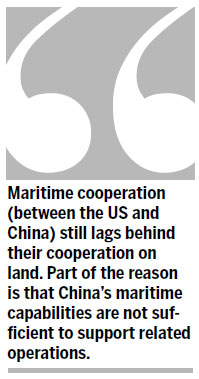Don't ignore the soft content
Efforts to build China into a sea power include pursuing 'converging interests' with others in oceanic development
At a study session with members of the Party leadership on July 30, China's top leader Xi Jinping championed efforts to build the country into a maritime power. His remarks aroused concerns that China's policy to address disputes in the East China Sea and South China Sea has changed. There are suspicions that China intends to rely on its military capabilities rather than peaceful approaches, such as dialogue and negotiation, to deal with the tensions, and that this will raise the risk of potential clashes, which would not only be against the interests of countries in the region, but also the interests of the United States.
As a rising power, China's current naval capabilities do not match its development level. The strengthening of its capabilities and increasing expenditure on building itself into a maritime power have not exceeded the normal level for a country at its stage of development, and accordingly, China should not be questioned or blamed.
In the context of the increasing uncertainties in the East China Sea and South China Sea, China's stance remains defensive and restrained.
China is not trying to utilize military strength to gain an advantage in resolving territorial disputes with neighboring countries. China has reaffirmed on various occasions that it persists in peaceful approaches such as negotiation and dialogue.
The problem is China's policies have been misinterpreted and distorted. Some media deliberately distort China's policies in order to define it as a destabilizing factor in the region. They ignore the "soft content", which is the core of China's policies.

When Xi advocated China becoming "a maritime power", he also emphasized that China would pursue "converging interests" with other countries. He said that China would make overall plans and take all factors into consideration, which means that China is acting in a responsible way to become a maritime power.
China's intention was also clearly outlined in the report former leader Hu Jintao delivered at the opening ceremony of the 18th CPC National Congress. The report said China's maritime policy should enhance its capacity to exploit marine resources, develop its marine economy, protect marine ecologies, resolutely safeguard the country's maritime rights and interests, and build itself into a maritime power.
Two things can be concluded from the report. The first is that China's dream of being a maritime power is a comprehensive design instead of pure military ambition. It not only addresses the protection of sovereignty but also stresses achieving joint development and win-win situations with other countries. The concept of a maritime power does not equate to a power with overwhelming military capability that can defeat other parties according to its will. That is the consideration for which the report included the content in the eighth part on "making great efforts to promote ecological progress" instead of the ninth part addressing accelerating the modernization of national defense and the armed forces.

























